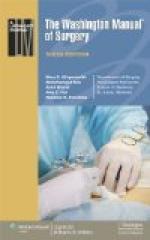General Treatment.—The patient should be kept at rest, preferably in bed, to diminish the general tissue waste; and the diet should be restricted to fluids, such as milk, beef-tea, meat juices or gruel, and these may be rendered more easily assimilable by artificial digestion if necessary. To counteract the general effect of toxins absorbed into the circulation, specific antitoxic sera are employed in certain forms of infection, such as diphtheria, streptococcal septicaemia, and tetanus. In other forms of infection, vaccines are employed to increase the opsonic power of the blood. When such means are not available, the circulating toxins may to some extent be diluted by giving plenty of bland fluids by the mouth or normal salt solution by the rectum.
The elimination of the toxins is promoted by securing free action of the emunctories. A saline purge, such as half an ounce of sulphate of magnesium in a small quantity of water, ensures a free evacuation of the bowels. The kidneys are flushed by such diluent drinks as equal parts of milk and lime water, or milk with a dram of liquor calcis saccharatus added to each tumblerful. Barley-water and “Imperial drink,” which consists of a dram and a half of cream of tartar added to a pint of boiling water and sweetened with sugar after cooling, are also useful and non-irritating diuretics. The skin may be stimulated by Dover’s powder (10 grains) or liquor ammoniae acetatis in three-dram doses every four hours.
Various drugs administered internally, such as quinine, salol, salicylate of iron, and others, have a reputation, more or less deserved, as internal antiseptics.
Weakness of the heart, as indicated by the condition of the pulse, is treated by the use of such drugs as digitalis, strophanthus, or strychnin, according to circumstances.
Gastro-intestinal disturbances are met by ordinary medical means. Vomiting, for example, can sometimes be checked by effervescing drinks, such as citrate of caffein, or by dilute hydrocyanic acid and bismuth. In severe cases, and especially when the vomited matter resembles coffee-grounds from admixture with altered blood—the so-called post-operative haematemesis—the best means of arresting the vomiting is by washing out the stomach. Thirst is relieved by rectal injections of saline solution. The introduction of saline solution into the veins or by the rectum is also useful in diluting and hastening the elimination of circulating toxins.
In surgical inflammations, as a rule, nothing is gained by lowering the temperature, unless at the same time the cause is removed. When severe or prolonged pyrexia becomes a source of danger, the use of hot or cold sponging, or even the cold bath, is preferable to the administration of drugs.




